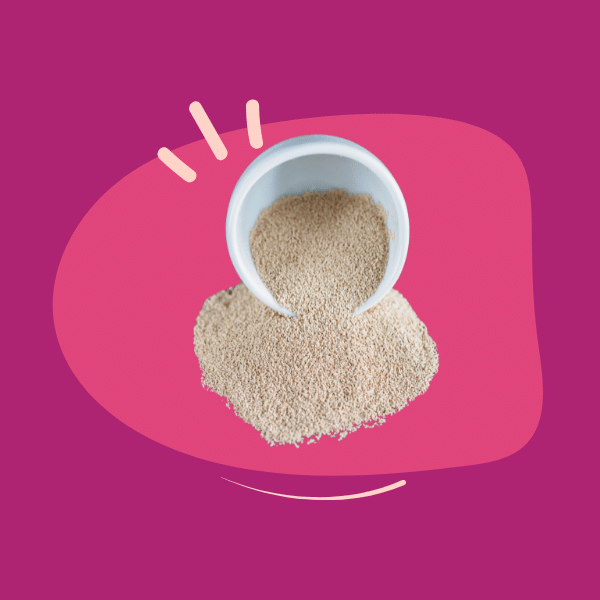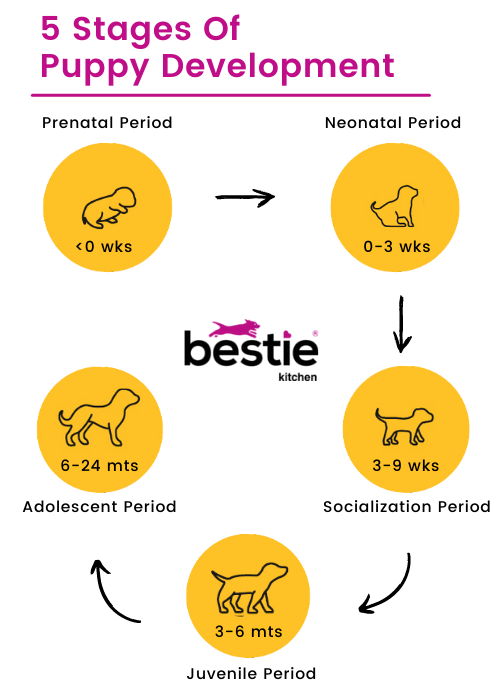In a nutshell: The Link Between Stress And Behavioural Problems in Dogs...It Can start in Puppyhood
-
Behavioural problems in dogs are often a result of stress during early development.
-
Elevated cortisol during pregnancy impairs the behavioural development of the puppies.
-
Puppies are most vulnerable to stress during the socialisation period of development.
-
The environment provided by private and commercial dog breeders can be stressful and overlaps with the most sensitive periods of behavioural development.
-
Main stressors include confined living, inadequate socialisation, and early weaning.
-
Adverse effects of stress include a short attention span, anxiety, fear, and aggression.
-
Avoid behavioural problems in your dog by selecting a caring breeder, including specific nutraceutical supplements (like The Chill-Pup) to ease anxiety, and promoting positive interaction early in your puppy’s development.
Behavioural problems in dogs are a widespread concern that few people know how to handle. Emerging research has found stress and problematic behaviour to be directly related to one another.
In this article, we'll see what often causes behavioural problems in dogs and how we can better help support their mental health.
How does stress lead to behavioural problems in dogs?
Did you know that your dog can experience stress even before they’re born? If the mother is stressed during pregnancy, this will affect the puppy’s development in the womb.
So, how does stress transfer from the mother to puppies?
It all comes down to one hormone - cortisol.
When your dog is stressed, the brain gives instructions to the adrenal glands to release cortisol into the bloodstream. Cortisol activates a fight-or-flight response that stimulates energy production, increases heart rate, and changes behaviour.
If your dog is pregnant, this cortisol will affect both the mother and the puppies. Some adverse effects of a stressed pregnancy include:
- Aggression towards other animals or people.
- Difficulty learning new tasks.
- Anxiety and fearfulness.
To learn more about prenatal stress, researchers turned to foxes. Gently picking up a pregnant female fox for one minute every day leads to puppies being born with increased levels of cortisol. After five weeks, they also noted behavioural changes associated with fear and anxiety (1). Other studies have shown similar results, drawing a clear connection between prenatal stress and its effects on the healthy development of puppies.
If you’re looking to introduce a puppy into your life, set aside some time to meet the breeder and learn about their stress management practices. The most important factor to supporting the health of your new puppy is making sure the mother is loved, cared for, and healthy!
A closer look behind pet stores* and dog breeders
With so many dog breeders and pet stores, it’s hard to pick the right one. (And while some Australian states no longer allow dogs to be sold in pet shops, others do allow it.)
First, you need to consider how breeders care for their dogs. This will take some research, but we’re here to give you some background.
Private Dog Breeders
Private breeders seem to be more involved with caring for their dogs and puppies. This can help prevent stress-induced changes that can affect your puppy for the rest of its life.
Always develop a relationship with a potential breeder and see first hand how they interact with their dogs. Private breeders have a better reputation for pet care, but this isn't always the case.
Looking at 48 breeding kennels in Europe, researchers found every kennel to have problems with animal care standards (2). The main concerns included early weaning and inadequate socialisation of puppies.
As future pet owners, this urges us to be proactive and learn about a breeder before taking a puppy home.
Commercial Dog Breeders
Another option is buying dogs through commercial breeders and pet stores. However, research has shown that in these environments, several stressors are often introduced into a puppy's life early in development. These stressors also affect the pregnant mother and include:
- Confinement- Minimise living space.
- Lack of socialisation - Little to no enrichment.
- Minimal positive human interaction - Stressed by the presence of humans.
- Poor health conditions - Inadequate care.
Over the past 27 years, studies conducted in North America and Europe found that dogs sold through high-volume commercial breeders are more likely to develop problematic behaviours(3).
There’s also plenty of room to improve dog breeding operations in Australia. For example, Queensland currently has no limit on the number of dogs that a facility is allowed to keep – leading to overcrowded conditions. Combine this with a vague ‘once a day’ socialisation allowance, we begin to see how these conditions can be detrimental to the behavioural development of puppies.
As current and future dog owners, these unfavourable conditions are something we shouldn't support.
(While some Australian states have passed progressive legislation other states have done very little to protect the welfare of dogs. You can read more about the state of play here at Oscar’s Law. Established in 2010, Oscar's Law seeks to abolish the factory farming of our companion animals.)
Effects of stress: puppies and development
Stress introduced during your puppy’s development can have lasting behavioural effects. The most influential period in your puppy’s life begins in the womb and extends through adolescence (4).

These critical stages of development are divided into five periods, each affected by different stressors:
1. Prenatal Period- Puppy is inside the mother’s womb (< 0 days).
This is the first stage of development and is heavily influenced by maternal stress and cortisol. With the embryo rapidly developing, exposure to cortisol causes physiological changes to the brain’s environment - impairing neural development(3).
For most owners, the influence of cortisol becomes clear only after your dog develops problematic behaviour in adulthood. Some indicators of maternal stress include anxiety, fearfulness, and diminished attention span (1).
2. Neonatal Period - Puppy affected by early-life experiences (0-21 days old).
There’s a crucial three-week window immediately after birth where positive interactions between mother and puppies promote healthy behavioural development.
In large-scale breeding operations, puppies are often separated too early from the mother (before eight weeks of age). This limits mother-puppy interactions, altering genes of the central nervous system related to anxiety and mood disorders (5).
3. Socialisation Period- Puppy interacting with other animals, humans, and objects (3 - 9 weeks old).
This is the period where puppies become independent and rely less on their mother. Socialisation is essential because it's a form of enrichment that teaches the puppy how to interact with other animals and humans.
Puppies are hypersensitive to positive and negative experiences around eight weeks of age (6). This age is so sensitive that a single negative experience can have lasting effects on your dog's ability to cope with stress. Without adequate socialisation, puppies will develop fear and stress responses in adulthood.
4. Juvenile Period - Puppy’s transported from breeding facilities, to pet stores or new homes (3 - 6 months old).
As puppies reach the juvenile period, they’re often transported to pet stores. This period of transition can be full of new sounds, scents, and sights - all stressors for your puppy (3). These stressors continue to accumulate as the puppies are introduced to potential pet owners and unfamiliar animals.
Although some puppies are homed soon after arriving to the pet store, others are less fortunate. The longer a puppy remains at the pet store, the more likely they are to experience negative interactions with other animals and humans.
In addition, puppies are often returned to pet stores and rehomed - this only increases the potential exposure to stressors.
To improve the wellbeing of puppies during this key period in behavioural development, pet stores should take every precaution to minimize adverse experiences for the puppies.
5. Adolescent Period - (6 – 24 months old).
Even after a puppy has found a new home, they continue to face stressful situations.
If there are other pets or children around, keep an eye on how your puppy is handling their new environment.
A recent study found puppies that experience trauma between 2 - 14 months old are at increased risk of developing a fear response in adulthood. For example, puppies who were victims of a dog attack during this period were significantly more likely to have owner-directed aggression as adults(4).
Dogs will continuously be exposed to stress throughout their lifetime, but how they cope with this stress depends on early life experiences (as well as genetics). Not only is stress management important for your puppy's behavioural development, but it also helps keep your family safe.
How to avoid behavioural problems in your dog
There's a clear link between behavioural problems in dogs and the amount of stress they experience during development.
Luckily, there are several ways you can reduce your dog's stress.
Learn about the breeder
To help your new puppy start on the right foot, make sure you learn about the breeder.
You’ll want to find out:
- What steps does the breeder take to reduce the mother's stress during pregnancy?
- How does the breeder promote socialisation in puppies?
We want to take every precaution to minimise negative stressors!
Regardless of the breed, studies have shown dogs from ‘less responsible’ breeders are at high risk of developing mental health concerns (3). This further emphasizes the importance of visiting the breeder, but only 47% of new pet owners take the time to do so (7).
Add calming supplements to your pet’s diet
Calming supplements are a convenient way to help reduce stress and anxiety in pets. These supplements often provide a holistic approach to helping your pet cope with separation anxiety, unfamiliar environments, and other stressful events(8).
At Bestie Kitchen, we want to do our part and support pets through stress. Working with our consulting veterinarian, we've formulated two specific health boostersthat tackle this issue.
- 'The Om'- Helps address your dog's anxious behaviour before it becomes aggressive or causes long-term health problems. The Om is a jelly treat with valerian, tryptophan, l-theanine and linden that comes in vet-formulated clinical daily doses (8).
- 'The Chill-Pup' - This immune-boosting and calming health jelly, with reishi mushroom, magnesium, and antioxidants is specifically formulated to support your puppy’s health as they grow, and reduce puppy stress (9).
You could also consider pheromone sprays which contain natural pheromones that appeal to dogs and help them adapt to everyday stressors.
ADAPTIL is one of the leading producers of pheromone sprays proven to reduce stress - including pregnant dogs. Based on findings in 20 dogs, the use of ADAPTIL pheromones increased maternal instincts and engagement with newborn pups.
This means the mothers were more attentive to their puppies and remained with them for an extended period (10). By reducing stress, we can promote positive interactions and avoid problematic behaviour.
Promote positive interactions early in development
Puppies need positive interactions as soon as they're born. These interactions come from direct stimulation between mother-pup, littermates, and humans (3).
Positive interactions are a form of stimulation that benefits the behavioural development of dogs. In the first 21 days after birth, positive stress promotes healthy neural development and improves long-term coping mechanisms(3).
Integrative vet Dr Kathy Cornack says that people are often over-protective of puppies when they’re young.
“They might get obsessed about their puppy getting parvo virus so they don't take them out for a walk. And then you get this six month old dog that hasn't seen any other dogs and it's going bananas and it's frightened and doesn't know normal social behaviours,” she says.
Trainer Eve McKenzie agrees.
“If we wait until they're, you know, four months, five months, six months down the track, it's almost like putting a child in the closet for three years and then opening and saying, well, here's the world.”
Eve believes it’s our responsibility to show the animal the world in a very positive, methodical way, early. (We cover more about fear stages and anxiety in this post: Why do dogs get anxious?)
A recent study found that newborn puppies exposed to gentle handling were more emotionally stable and eager to explore. These findings highlight the importance of positive interactions in puppy development (11).
Bottom Line
Dogs are social animals, and how they interact with their environment will impact behavioural development.
The best way to prevent behavioural problems in dogs is to reduce stress at every stage of puppy development, including pregnancy. By meeting with potential breeders, you can have a significant role in reducing stress and promoting your dog’s mental health!
If your dog is already facing stress and anxiety, we're here to help.
Try supplementing your dog with our Bestie Kitchencalming jellies to promote healthy coping habits in anxious situations. Even consider combining our calming jellies with pheromone sprays to provide added behavioural support.
Read more articles on our website to find out how we help you give your dogs and cats happy, healthy lives.
References:
- Braastad, B.O., Osaduchuk, L.V., Lund, G., Bakken, M., 1998. Effects of prenatal handling stress on adrenal weight and function and behaviour in novel situations in blue fox cubs (Alopex lagopus). Appl. Anim. Behav. Sci. 57, 157e169.
- De Meester, Rudy, Moons, C., van Bree, H., & Coopman, F. (2005). Critical evaluation of the environment in Belgian dog breeding kennels during the puppies’ socialization period. VLAAMS DIERGENEESKUNDIG TIJDSCHRIFT, 74(5), 364–374.
- McMillan, F.D. (2017). Behavioral and psychological outcomes for dogs sold as puppies through pet stores and/or born in commercial breeding establishments: Current knowledge and putative causes. Journal of Veterinary Behavior: Clinical Applications and Research, 19, 14–26.
- Serpell JA, Duffy DL. Aspects of Juvenile and Adolescent Environment Predict Aggression and Fear in 12-Month-Old Guide Dogs. Front Vet Sci. 2016;3:49. Published 2016 Jun 22. doi:10.3389/fvets.2016.00049
- Sánchez MM, Ladd CO, Plotsky PM. Early adverse experience as a developmental risk factor for later psychopathology: evidence from rodent and primate models. Dev Psychopathol. 2001 Summer;13(3):419-49. doi: 10.1017/s0954579401003029. PMID: 11523842.
- Fox MW, Stelzner D. Approach/withdrawal variables in the development of social behaviour in the dog. Anim Behav. 1966 Apr-Jul;14(2):362-6. doi: 10.1016/s0003-3472(66)80098-2. PMID: 5956605.
- Kinsman RH, Casey RA, Knowles TG, et al. Puppy acquisition: factors associated with acquiring a puppy under eight weeks of age and without viewing the mother. Vet Rec. 2020;187(3):112. doi:10.1136/vr.105789
- Landsberg G, Milgram B, Mougeot I, Kelly S, de Rivera C. Therapeutic effects of an alpha-casozepine and L-tryptophan supplemented diet on fear and anxiety in the cat. J Feline Med Surg. 2017;19(6):594-602. doi:10.1177/1098612X16669399
- Ando I, Karasawa K, Yokota S, Shioya T, Matsuda H, Tanaka A. Analysis of serum magnesium ions in dogs exposed to external stress: A pilot study. Open Vet J. 2017;7(4):367-374. doi:10.4314/ovj.v7i4.13
- Santos NR, Beck A, Blondel T, Maenhoudt C, Fontbonne A. Influence of dog-appeasing pheromone on canine maternal behaviour during the peripartum and neonatal periods. Vet Rec. 2020 Apr 18;186(14):449. doi: 10.1136/vr.105603. Epub 2019 Dec 26. PMID: 31879321; PMCID: PMC7279134.
- Gazzano, A., Mariti, C., Notari, L., Sighieri, C., McBride, E.A., 2008. Effects of early gentling and early environment on emotional development of puppies. Appl.Anim. Behav. Sci. 110, 294e304.
Reference Links:
- (Brasstad) https://www.infona.pl/resource/bwmeta1.element.elsevier-3bf239ae-91d5-3e49-8a3f-c9ca304b53f8
- (De Meester) https://biblio.ugent.be/publication/350711
- (McMillan) https://www.semanticscholar.org/paper/Behavioral-and-psychological-outcomes-for-dogs-sold-Mcmillan/150d88781141573a00d7f0f1dd73d8709a4d3aec
- (Serpell) https://www.ncbi.nlm.nih.gov/pmc/articles/PMC4916180/
- (Sanchez) https://pubmed.ncbi.nlm.nih.gov/11523842/
- (Fox) https://pubmed.ncbi.nlm.nih.gov/5956605/
- (Kinsman) https://www.ncbi.nlm.nih.gov/pmc/articles/PMC7456714/
- (Landsberg) https://www.ncbi.nlm.nih.gov/pmc/articles/PMC5505228/
- (Ando) https://www.ncbi.nlm.nih.gov/pmc/articles/PMC5768924/
- (Santos) https://pubmed.ncbi.nlm.nih.gov/31879321/
- (Gazzano) https://www.sciencedirect.com/science/article/abs/pii/S0168159107001608















